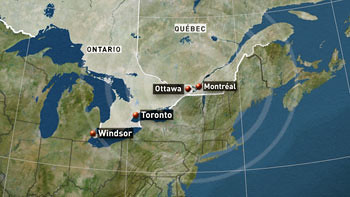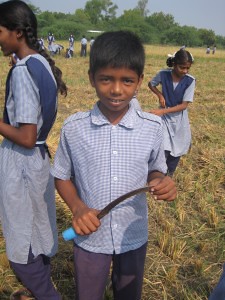Cross posted from Worldwatch Institute’s Nourishing the Planet.
 In Zambia, sorghum-a drought resistant cereal that thrives in the country- was considered a “poor man’s crop” in the past, often shunned by small-scale farmers for the more commercially viable maize. But an article in the June issue of Farming Matters explains how a Zambian brewery with a new brand of beer is changing the way small-scale farmers think about sorghum.
In Zambia, sorghum-a drought resistant cereal that thrives in the country- was considered a “poor man’s crop” in the past, often shunned by small-scale farmers for the more commercially viable maize. But an article in the June issue of Farming Matters explains how a Zambian brewery with a new brand of beer is changing the way small-scale farmers think about sorghum.
While most clear beers such as lagers and pilsners are made with expensive, imported malts, the Zambian Breweries‘ Eagle Lager is made from sorghum. A subsidiary of the South African-based SABMiller, Zambian Breweries purchases sorghum from local farmers, increasing farmers’ income and providing local grocery stores with an affordable lager.
To help farmers partner with the brewery, the Cooperative League of the United States of America (CLUSA), with funding from the United States Agency for International Development (USAID) and the International Fund for Agricultural Development (IFAD), provides loans for farmers’ start-up expenses, as well as agricultural training to make sure their crops meet the brewery’s quality standards. With CLUSA’s support, the brewery gets a consistent supply of sorghum to produce its beer and farmers gain access to a secure market, a fixed price for their crop, and a consistent income.
To produce larger crop yields of higher quality sorghum, CLUSA and the brewery, encourage farmers to implement conservation agriculture-a combination of simple techniques such as minimal or zero-tillage, ground cover, crop rotation and inter-planting. Conservation agriculture can reduce the need for inputs, including artificial fertilizer, pesticides, and herbicides. And it benefits the other crops farmers are growing by helping improve soil fertility, controlling pests and weeds, and improving water management. In Zambia, maize yields have been increased by 75 percent and cotton yields by 60 percent thanks to conservation agriculture. (See also: Using the Market to Create Resilient Agriculture Practices, To Improve Competitiveness of Rural Businesses, Linking Farmers to the Private Sector, and a Sustainable Calling Plan.)
While Zambia Breweries’ collaboration with local farmers is working, not all partnerships between companies and farmers go so well. Without appropriate regulation, companies may take advantage of a monopoly; farmers can become indebted to the company and lose control of their farms and crops; and A BIG financial incentive to grow a specific crop can threaten overall crop diversity.
But in Zambia, more than 4,500 small-scale farmers in 14 districts are currently seeing an increase in their incomes due to their contract with Zambia Breweries. Recognizing the significance of this benefit, the Zambian government recently lowered taxes on Eagle Lager in order to encourage Zambian Breweries to continue working with local small-scale farmers. And SABMiller is trying to form similar partnerships with sorghum farmers in Uganda, Zimbabwe, Tanzania, and Mozambique.
To read more about how partnerships between local companies and small-scale farmers can improve livelihoods and provide other benefits to the environment and community see: Protecting Wildlife While Improving Food Security, Health, and Livelihoods, Improving African Women’s Access to Agriculture Training Programs, and Using Small Businesses to Create Local Markets.
Photo Credit: FAO
Thank you for reading! As you may already know, Danielle Nierenberg is traveling across sub-Saharan Africa visiting organizations and projects that provide environmentally sustainable solutions to hunger and poverty. She has already traveled to over 18 countries and visited 130 projects highlighting stories of hope and success in the region. She will be in Burkina Faso next, so stay tuned for more writing, photos and video from her travels.
If you enjoy reading this diary, we blog daily on Nourishing the Planet, where you can also sign up for our newsletter to receive weekly blog and travel updates. Also, please don’t hesitate to comment on our posts, we check them daily and look forward to an ongoing discussion with you
 At the
At the 


 At the
At the  Karl Lutze was born in 1920 in Sheboygan, Wisconsin. As a boy he watched his father and his uncle pull up in the Automobile his father had ordered, picked up at the train station, read the operators manual and driven home. During WWII Karl studied to be a wartime pastor, but by the time he finished seminary school the war was over. Instead of going overseas, Karl was assigned to a poor black parish in Muskogee, Oklahoma. The rest of Karl’s life was cast at that moment.
Karl Lutze was born in 1920 in Sheboygan, Wisconsin. As a boy he watched his father and his uncle pull up in the Automobile his father had ordered, picked up at the train station, read the operators manual and driven home. During WWII Karl studied to be a wartime pastor, but by the time he finished seminary school the war was over. Instead of going overseas, Karl was assigned to a poor black parish in Muskogee, Oklahoma. The rest of Karl’s life was cast at that moment.